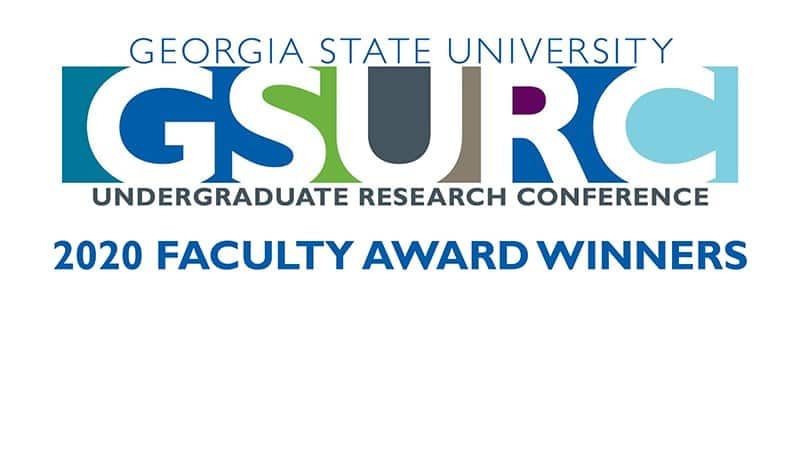
For the first time in its 14-year history, the Georgia State Undergraduate Research Conference has awarded three faculty members for their commitment to mentoring student research.
The conference, also known as GSURC, is an annual showcase hosted by the Honors College of undergraduate research ranging across all disciplines and topics.
“Nominations for the 2020 GSURC Faculty Research Awards came from more than 10 different academic units, which highlights the breadth of outstanding undergraduate research being done at Georgia State,” said Amy Reber, a senior lecturer in biology and the Honors College Faculty Associate for GSURC. “The pool was incredibly competitive and the awards committee was impressed by the phenomenal work being done by all of the nominees.”
Jamae Morris, assistant professor of African-American studies, is the recipient of the 2020 Faculty Award for Undergraduate Faculty Mentored Creative Projects and Research in Fine Arts and the Humanities. Morris is the organizer of the university’s African-American Undergraduate Research Colloquium (AURC) and has mentored 25 undergraduate researchers.
Daniel Cox, professor of neuroscience and biology and director of the Center of Neuromics in the College of Arts & Sciences, is the recipient of the 2020 Faculty Award for Undergraduate Project or Laboratory-Based Research. Cox has mentored more than 50 individual student research projects over the last 15 years and dozens of his students have submitted conference abstracts, received prestigious national awards, and pursued graduate education and career paths related to the work they conducted under Cox’s supervision.
Frank Williams, professor of anthropology, is the recipient of the 2020 Faculty Award for Undergraduate Mentored Research in Policy, Entrepreneurship, Education and Social Sciences. Williams has mentored more than 30 GSURC presenters over the years and more than a dozen honors students who have written theses and presented at state-level conferences. He also works with undergraduates in Georgia State’s Dental Micro-wear Laboratory, which has led to many graduate school and career opportunities for students.
Each award is valued at $300 and winners were selected by a committee of faculty including last year’s recipient.
This is also the first year GSURC will be a virtual event, in keeping with public health and university system guidelines surrounding the novel coronavirus (COVID-19) pandemic.
GSURC 2020 will take place later this month on an online video platform where students can record and upload their presentations to be judged by expert faculty. The winning presentations will be announced at the end of April and posted to the GSURC website.
“We know how much time and energy our students have invested in their research projects, and so the GSURC faculty advisory board is pleased to offer everyone the opportunity to present and be recognized for their work in a virtual conference,” Reber said.
Test courtesy of Georgia State University, News Hub.
Please visit https://news.gsu.edu/2020/04/06/gsurc2020facultyawards/ to view the orginal article.
Founded in 1978, the Council on Undergraduate Research (CUR) focuses on providing high-quality and collaborative undergraduate research, scholarly, and creative activity. Among the many activities and networking opportunities that CUR provides, the organization also offers support for the professional growth of faculty and administrators through expert-designed institutes, conferences, and a wide-range of volunteer positions. The CUR community, made up of nearly 700 institutions and 13,000 individuals, continues to provide a platform for discussion and other resources related to mentoring, connecting, and creating relationships centered around undergraduate research. CUR’s advocacy efforts are also a large portion of its work as they strive to strengthen support for undergraduate research. Its continued growth in connections with representatives, private foundations, government agencies, and campuses world-wide provides value to its members and gives voice to undergraduate research. CUR is committed to inclusivity and diversity in all of its activities and our community.
CUR focuses on giving a voice to undergraduate research with learning through doing. It provides connections to a multitude of campuses and government agencies, all while promoting networking and professional growth to its community.


